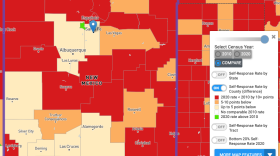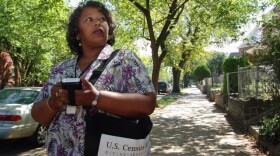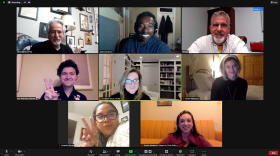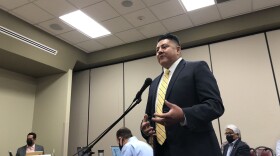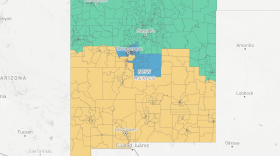Every 10 years after the census, the New Mexico state Legislature redraws its districts. While redistricting is always a contentious and often partisan task, this year, the drama is being felt by both parties. On Saturday, a compromise was reached: An independent committee would offer three to five maps that lawmakers choose from—and can change—before sending one to the governor. This clears the way for the bill to hit the Senate floor. KUNM spoke with Gwyneth Doland of New Mexico PBS to get a breakdown of the situation.
GWYNETH DOLAND: There was a task force that met for many months last year and into this year, a bipartisan group that was some sitting lawmakers, Democrats, Republicans, Senators, Representatives, also members of the community, good-government groups. There are some judges in there, folks like that. They wrote a bill, and they submitted it, that would take the task of redrawing these boundaries away from the lawmakers whose boundaries they are, right? Because it's a really obvious conflict of interest.
Now, they say they can be fair. But, you know, they could also not be fair. There are no guarantees, is the problem.
So they they came up with this bill, they put it in there and it got thrown into the sausage grinder. It didn't get as far as they wanted.
Now, there's a competing bill. There's a bunch out there, but there's a competing bill that's been moving. Sen. [Daniel] Ivey-Soto came up with this plan that would also create a committee, but it would be made of lawmakers, people from the House and Senate, you know. Essentially, it's the exact same thing, and it would really do it pretty much the way things are done now.
So the good-government groups didn't like that at all, and they've been negotiating a little bit.
KUNM: To me, it seems like nothing has moved so far. I mean ...
DOLAND: I think there's a lot of movement. There's a lot of what it seems to me, like, there's a lot of good-faith conversation going on. And there's a little bit of time left.
You know, one of the things that some of the lawmakers said—what Daniel Ivey-Soto said—he thought it might be unconstitutional to do it the way the task force said. And what they had suggested was—and they do this in other states, right?—they come up with three plans, I think it was, they asked the lawmakers, you know, just choose from the ones that we've come up with. They go through this whole public process: they get the maps spit out of the computer, they make sure they're sort of fair, and they say, you know, we think these are pretty fair in one way or the other. Choose from among them.
And some of the lawmakers said, 'Well, we think that might be unconstitutional' to take that choice away from them. Which I thought was a really interesting argument, because the task force was chaired by Justice [Edward] Chavez, who is a former state Supreme Court Justice, probably one of the people who knows the constitution pretty well you think, your know? He's been involved in redistricting legislation before. So, I think the overall feeling is that, that is probably constitutional, and that's not a very good argument.
KUNM: I read that House Speaker Brian Egolf had a beef or has a beef with this creation of an independent committee to decide. Can explain that a little bit for us?
DOLAND: He does, and he had said this many times. He told me this in an interview months ago. He is a liberal, obviously. He's a progressive. He's very committed to furthering liberal democratic goals. And he makes a very pragmatic argument that if democrats control the Legislature, they can do what voters sent them there to do. So, if you want legalized recreational marijuana, if you want to protect a woman's right to choose—this is what he says, you know—if you want more renewable energy, if you want to fairer tax structure, stuff like that, then you want us to keep doing what we're doing.
KUNM: I get that argument. You know, if Republicans took control of the Legislature, they could then do the same, right?
DOLAND: Well, gee, Khalil, that's exactly it. So, and it might take a while, right? We only redistrict every 10 years. But he's saying, you know, for the next 10 years, if we redistrict to our own advantage, then we can get a lot more done for us in the next 10 years. So I guess the question is: Do you want to encourage one-party rule for the next 10 years? If you're a Democrat? Maybe you do. But then: Do you want to make yourself vulnerable next time around?
KUNM: Tell me why is the Roundhouse caught up in this political posturing? It seems like, how is this serving New Mexicans actually?
DOLAND: Well, it's not posturing at all. And it's not just New Mexico. I mean, these fights are happening in every state House across the country, right? Republicans did very well last time in pursuing their own interests in some cases and actively gerrymandering in other cases, right? And so now the Democrats are like, 'Well, what's good for the goose is good for the gander. They gerrymandered the heck out of us, now we're gonna gerrymander the heck out of them. And it's only fair.'
In the long run, in terms of fairness, and in terms of the will of the people being done would require us to not seek short-term personal or political reward. But to try to move toward a system that just fairly and accurately represents who our people are and give them more power in having their will be done by the people they elect.
KUNM: Now, this is all dependent on the census data, which is not expected to be released until September due to COVID-19. Then we're going to have a special session. What do you think will happen when that session opens in September?
DOLAND: That is a really good question. You know, the census data is not expected to show a major change in the state's population. And you know, last time we redistricted in 2001 and in 2011, we had seen a lot more people coming into this state, and a whole lot of growth. Especially on Albuquerque's Westside—that really shifted things around a lot. I think the numbers we get from the census will be much smaller changes. And so that's probably a good thing, because it means there won't be really big fights. There's not quite as much at stake when you don't have to make really big changes.
What would that session look like I think really depends on the state of the pandemic. Normally, they meet in-person, but they do meet at an odd time of year when there's not usually a session, and nobody goes, you know, 'This is not on anybody's regular schedule.' Lobbyists—I mean the liquor lobbyists, and the oil and gas guys and the teachers—none of those folks who are up at the session all day, every day, they're not here in the redistricting session, because nobody's paying them to be, right? And regular people got to work.
So even though it is held in the public, it gets very little attention. And if the pandemic were still happening, you know, it's possible that they would be forced to do some more webcasting.
But the problem is very few committees meet. Really what happens is a lot of it is just done behind closed doors. You know, they go into caucus meetings. They sit in their offices. They talk one-on-one. But they're not having the same kind of committee meetings all day or floor sessions all day. So I think if people are not going to be allowed in the building, I think the secrecy with which redistricting happens will probably be increased.
***
Your New Mexico Government is a collaboration between KUNM, New Mexixo PBS and the Santa Fe Reporter. Funding for our coverage comes from the Kellog Foundation and KUNM listerns like you, with support for pubic media provided by the Thornburg Foundation.



